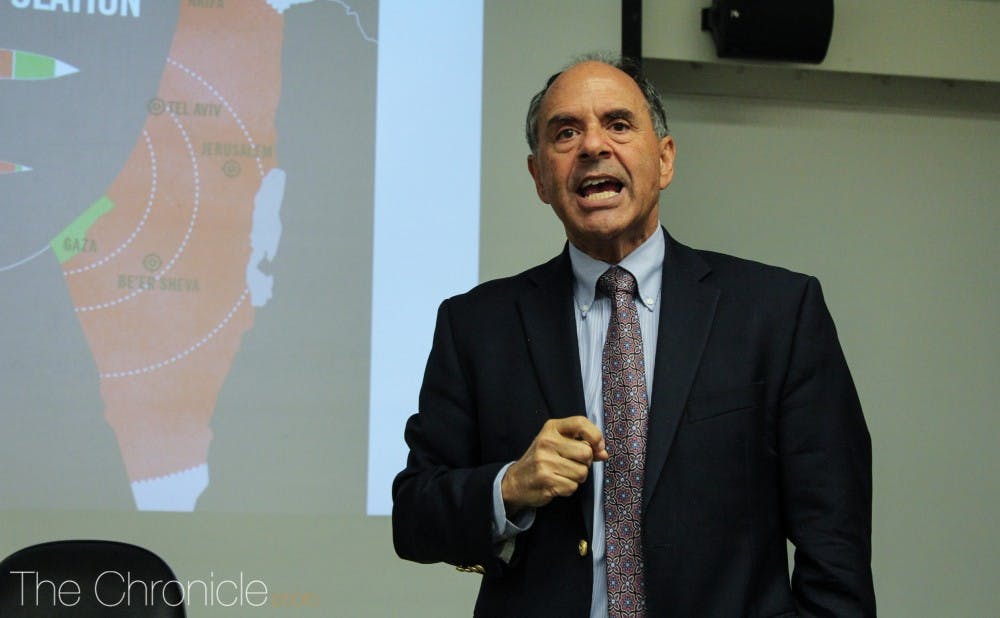As Israel celebrates its 70th year of independence, Chuck Freilich, former deputy national security advisor to the Israel National Security Council, offered his perspective on the issues surrounding Israeli security.
Freilich, currently a senior fellow at the Harvard Kennedy School, grew up in Israel and served as a major in the Israeli Defense Forces. His talk—called "The Future of Israeli Security"—aimed to provide background on Israeli issues and challenge the thinking of his audience.
“Israel is a strategic nightmare,” Freilich said. “[Americans] cannot understand what it means to live when you are always within minutes of a border, usually a hostile one.”
The country, roughly the size of New Jersey, is long and thin—at some points less than ten miles wide. Freilich noted that most of the “strategic targets" are all within a narrow stretch of the country that's within easy artillery and rocket range from the hilly areas in the West Bank.
Not only is Israel in a strategically weak location, but Freilich was quick to point out that there are larger disadvantages. He mentioned that there are 22 other countries in the Arab League, with a combined population of over 300 million people and different political objectives.
“The very most that Israel wants is the West Bank and the Golan Heights,” he said. “The Arab minimum is the West Bank and the Golan Heights, and the maximum, for some of the Arab world, is still all of Israel.”
The fear of this destruction is at the forefront of Israeli security policy.
Freilich differentiated between politicide, the destruction of the state that many other countries have faced, and the complete genocide that Israel fears. This fear came from the discourse of destruction that often came from other nations in the past and that still comes from Iran to this day, he said.
“The thought of genocide, of being wiped out, is something that many people in the world cannot fathom," he said. "In the Israeli case, it's a very real possibility.”
Freilich said that Israel often exaggerates this fear, but the fear comes from a legitimate place. Domestically, Israel has to worry about small and large acts of terrorism. On an international level, Iran has not given up on its goal to “go nuclear," he said. He also sees cyber attacks as a concern in the coming years.
The one thing keeping Israel from destruction, he argued, is the fact that the surrounding Arab armies are either allies of Israel or too weak to fight. Furthermore, Israel is now a well-established country that cannot be easily wiped out.
“The founding prime minister, [David] Ben-Gurion, said that if and when Israel’s Jewish population reached five million, Israel’s existence would be secure forever,” Freilich said. “Well today, we’re just under seven million.”
The biggest issues facing Israel now are the threats from Hezbollah, the division of Jerusalem and Palestinian refugees. Hezbollah, a terrorist group in Lebanon, has more than 120,000 rockets, according to Freilich.
Speaking on the conflict between Israel and Palestine, Freilich said that most of that debate is “uninformed.” If Israel were to merge with the Palestinians in the West Bank, it would change the religious balance between Jews and Muslims in the country from an 80-20 percent ratio to 60-40 percent. Israel would no longer be a Jewish state, Freilich claimed.
But if Israel does not grant Palestinians citizenship or the right to vote, Israel would no longer be a democracy, he said.
“Now, I don’t think there are any chances of progress [in] the next few years," he said. "Israel doesn’t have the leadership, the Palestinians don’t have the leadership and the current American administration is not what’s needed for this work.”
Despite these security threats and ongoing issues, Freilich is confident in Israel’s ability to survive.
“I believe that Israel’s national security strategy has been a dramatic success because Israel has won its existence," he said. "Israel today has a stable thriving democracy, a flourishing economy and an essentially secure state. Nobody can wipe us off the face of the Earth anymore. Israel’s existence is here to stay.”
Get The Chronicle straight to your inbox
Signup for our weekly newsletter. Cancel at any time.

Maria Morrison was a digital strategy director for The Chronicle's 117th volume. She was previously managing editor for Volume 116.

